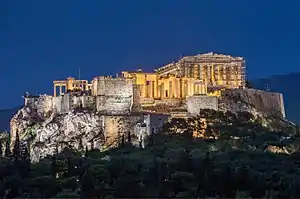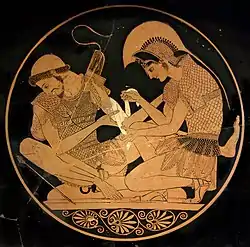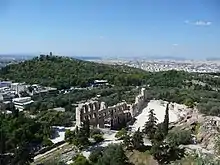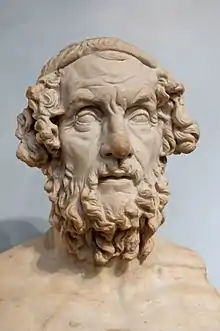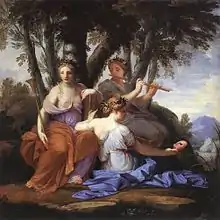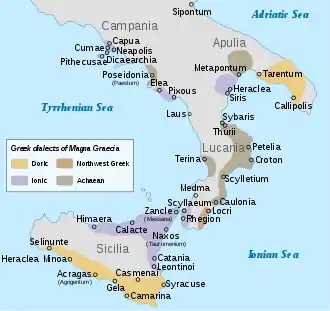Outline of ancient Greece
The following outline is provided as an overview of and topical guide to ancient Greece:
Geography of Ancient Greece
Regions of Ancient Greece
- Peloponnese
- Central Greece
- Thessaly
- Pherae
- Larissa
- Autonomous Subregion
- Magnesia
- Subregions within Thessaly
- Achaea Phthiotis
- Histiaeotis
- Pelasgiotis
- Perrhaebia
- Epirus
- Macedon
- Aegean Sea
- Crete
- Cyprus
- Ionian Sea
- Hellespont
- Sea of Marmara
- Bosphorus
- Asia Minor
- Magna Grecia
- Greek colonies
Government and politics of ancient Greece
Ancient Greek law
- Dreros inscription – the earliest surviving inscribed law from ancient Greece.
- Ancient Greek lawmakers
- Draco – first legislator of Athens in Ancient Greece. He replaced the prevailing system of oral law and blood feud by a written code to be enforced only by a court. Draco's written law became known for its harshness, with the adjective "draconian" referring to similarly unforgiving rules or laws.
- Draconian constitution – first written constitution of Athens. So that no one would be unaware of them, they were posted on wooden tablets (ἄξονες – axones), where they were preserved for almost two centuries, on steles of the shape of three-sided pyramids (κύρβεις – kyrbeis).
- Solon – Athenian statesman and lawmaker, remembered for the Solonian Constitution.
- Solonian Constitution – a code of laws embracing the whole of public and private life. It sought to revise or abolish the older laws of Draco.
- Seisachtheia – a set of laws instituted by the Athenian lawmaker Solon in order to rectify the widespread serfdom and slavery that had run rampant in Athens by the 6th century BC, by debt relief.
- Solonian Constitution – a code of laws embracing the whole of public and private life. It sought to revise or abolish the older laws of Draco.
- Draco – first legislator of Athens in Ancient Greece. He replaced the prevailing system of oral law and blood feud by a written code to be enforced only by a court. Draco's written law became known for its harshness, with the adjective "draconian" referring to similarly unforgiving rules or laws.
Military history of ancient Greece
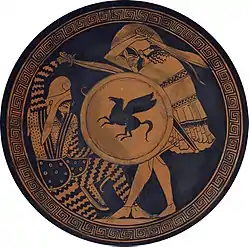
Greek hoplite and Persian warrior depicted fighting, on an ancient kylix, 5th century BC
Military history of ancient Greece
Military of ancient Greece
Military powers and alliances
- Ionian League (started mid-7th century BC)
- 1st Achaean League (formed in 5th century BC)
- Delian League (478–404 BCE)
- Spartan hegemony (431–371 BCE)
- Theban hegemony (371–362 BCE)
- League of Corinth (338–322 BCE)
- Peloponnesian League (6th to 4th century BC)
- Arcadian League (370 to 3rd century BCE)
- 2nd Achaean League (280–146 BCE)
- Aetolian League (4th to 3rd century BCE?)
Military conflicts
- Trojan War
- Lelantine War
- Messenian Wars
- First Sacred War
- Greco-Persian Wars – series of conflicts between the Achaemenid Empire of Persia and city-states of the Hellenic world that started in 499 BC and lasted until 449 BC.
- First Peloponnesian War
- Sicilian Wars
- Peloponnesian War
- Battle of Arginusae
- Battle of Delium
- Battle of Rhium
- Battle of Sybota
- Battle of Potidaea
- Battle of Naupactus
- Battle of Notium
- Battle of Syme
- Battle of Cynossema
- Battle of Pylos
- Battle of Sphacteria
- Battle of Amphipolis
- Battle of Mantinea (418 BC)
- Battle of Olpae
- Sicilian Expedition
- Battle of Syme
- Battle of Cyzicus
- Battle of Aegospotami
- Corinthian War
- Battle of Coronea (394 BC)
- Battle of Naxos
- Battle of Leuctra
- Battle of Cynoscephalae
- Battle of Mantinea (362 BC)
- March of the 10,000
- Battle of Crocus Field
- Foreign War
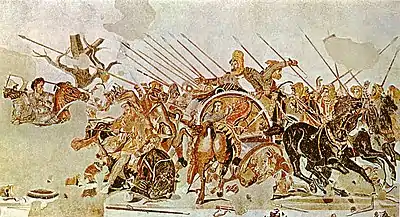
- Wars of Alexander the Great
- Battle of Chaeronea
- Battle of the Granicus
- Battle of Issus
- Siege of Tyre (332 BC)
- Battle of Gaugamela
- Battle of the Hydaspes River
- Lamian War
- Wars of the Diadochi
- Chremonidean War
- Battle of Sellasia
- Battle of Pydna
- Battle of Cynoscephalae
- Battle of Asculum
- Cretan War
- First Macedonian War
- Second Macedonian War
- Third Macedonian War
- Fourth Macedonian War
General history of ancient Greece
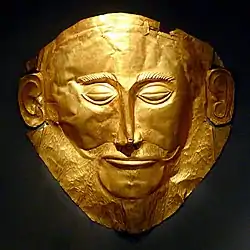
Death mask, known as the Mask of Agamemnon, 16th century BC, probably the most famous artifact of Mycenaean Greece
Ancient Greek history, by period
- Prehistoric Greek history
- History of ancient Greece (timeline)
Ancient Greek history, by region
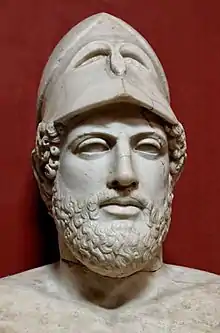
Bust of Pericles, marble Roman copy after a Greek original from c. 430 BC
- Ancient Athens
- Athenian democracy – democracy in the Greek city-state of Athens developed around the fifth century BC, making Athens one of the first known democracies in the world, comprising the city of Athens and the surrounding territory of Attica. It was a system of direct democracy, in which eligible citizens voted directly on legislation and executive bills.
- Solon (c. 638 – c. 558 BC)– Athenian statesman, lawmaker, and poet. Legislated against political, economic, and moral decline in archaic Athens. His reforms failed in the short term, yet he is often credited with having laid the foundations for Athenian democracy.[1][2][3][4]
- Cleisthenes (born around 570 BC). – father of Athenian democracy. He reformed the constitution of ancient Athens and set it on a democratic footing in 508/7 BC.
- Ephialtes (died 461 BC) – led the democratic revolution against the Athenian aristocracy, which exerted control through the Areopagus, the most powerful body in the state.[5] Ephialtes proposed a reduction of the Areopagus' powers, and the Ecclesia (the Athenian Assembly) adopted Ephialtes' proposal without opposition. This reform signaled the beginning of a new era of "radical democracy" for which Athens would become famous.
- Pericles – arguably the most prominent and influential Greek statesman. When Ephialtes was assassinated for overthrowing the elitist Council of the Aeropagus, his deputy Pericles stepped in. He was elected strategos (one of ten such posts) in 445 BCE, which he held continuously until his death in 429 BCE, always by election of the Athenian Assembly. The period during which he led Athens, roughly from 461 to 429 BC, is known as the "Age of Pericles".
- Ostracism – procedure under the Athenian democracy in which any citizen could be expelled from the city-state of Athens for ten years.
- Areopagus – council of elders of Athens, similar to the Roman Senate. Like the Senate, its membership was restricted to those who had held high public office, in this case that of Archon.[6] In 594 BC, the Areopagus agreed to hand over its functions to Solon for reform.
- Ecclesia – principal assembly of the democracy of ancient Athens during its "Golden Age" (480–404 BCE). It was the popular assembly, open to all male citizens with 2 years of military service. In 594 BC, Solon allowed all Athenian citizens to participate, regardless of class, even the thetes (manual laborers).
- Athenian democracy – democracy in the Greek city-state of Athens developed around the fifth century BC, making Athens one of the first known democracies in the world, comprising the city of Athens and the surrounding territory of Attica. It was a system of direct democracy, in which eligible citizens voted directly on legislation and executive bills.
- History of Sparta
- History of Macedonia (ancient kingdom)
- History of Crete#Iron Age and Archaic Crete
- Asia Minor#Greek West
- History of Greek and Hellenistic Sicily
- Greeks in pre-Roman Gaul
- Cyrenaica#Greek rule
- Bosporan Kingdom
- Ptolemaic Kingdom
- Coele-Syria
- Seleucid Empire
- Greco-Bactrian Kingdom
- Indo-Greek Kingdom
Ancient Greek History, by subject
Works on ancient Greek history
Culture of ancient Greece
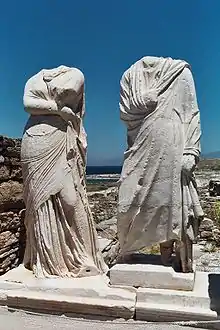
Statues at the "House of Cleopatra" in Delos, Greece. Man and woman wearing the himation
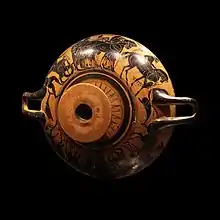
Kylix, the most common drinking vessel in ancient Greece
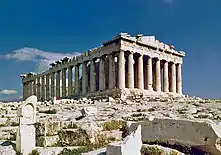
The Parthenon, shows the common structural features of Ancient Greek architecture: crepidoma, columns, entablature, and pediment
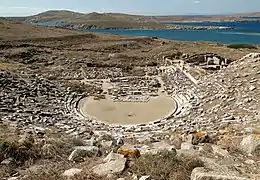
Ancient Greek theatre in Delos
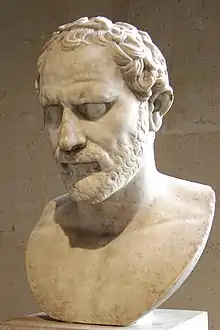
Portrait of Demosthenes, statesman and orator of ancient Athens
Culture of ancient Greece
- Calendars of ancient Greece
- Clothing in ancient Greece
- Clubs in ancient Greece
- Coinage of ancient Greece
- Cuisine of ancient Greece
- Education in ancient Greece
- Fiction set in ancient Greece
- Greek gardens
- Marriage in ancient Greece
- People in ancient Greece
- Sexuality in ancient Greece
- Slavery in ancient Greece
- Women in Classical Athens
Architecture of ancient Greece
Architecture of ancient Greece
Art in ancient Greece
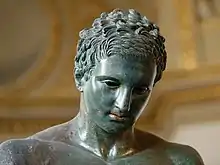
Croatian Apoxyomenos (detail), bronze statue from the 2nd or 1st century BC
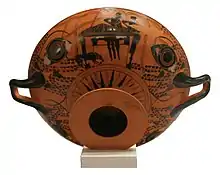
Two youths feasting in a vineyard. Attic black-figure kylix, ca. 530 BC
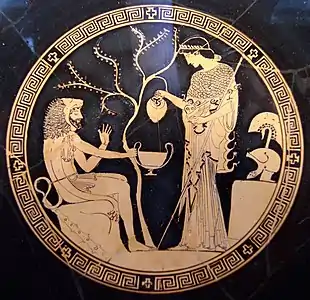
Tondo of a red-figure kylix depicting Herakles and Athena, by Phoinix (potter) and Douris (painter),
ca. 480–470 BC
ca. 480–470 BC
Art in ancient Greece
- Death in ancient Greek art
- Music in ancient Greece
- Painting in ancient Greece
- Pottery of ancient Greece
- Sculpture in ancient Greece
- Sport in ancient Greek art
- Theatre of ancient Greece
- Warfare in ancient Greek art
Literature in ancient Greece
Literature in ancient Greece
Philosophy in ancient Greece
.JPG.webp)
The School of Athens, a famous fresco by the Italian Renaissance artist Raphael, with Plato and Aristotle as the central figures in the scene
Philosophy in ancient Greece
- Ancient Greek schools of philosophy
- Pre-Socratic
- Classical Greek
- Hellenistic
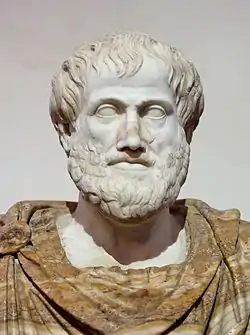
Roman copy in marble of a Greek bronze bust of Aristotle by Lysippus, c. 330 BC
Language in ancient Greece
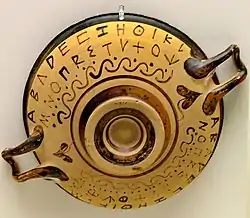
Early Greek alphabet on pottery
- Ancient Greek, by period
- Ancient Greek dialects
- Ancient Greek grammar
- Ancient Greek phonology
- Greek alphabet
- Greek diacritics
- Greek inscriptions
- Greek Numbers
- Greek numerals
- Greek orthography
- Greek phrases
- Greek verbs
- Greek words for love
Religion in ancient Greece
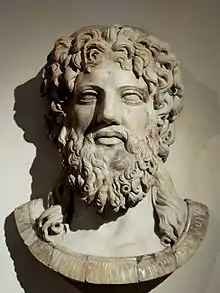
Zeus, king of the Olympian gods
Religion in ancient Greece
- Twelve Olympians
- Greek mythology
- Religious practices
- Ancient Greek religious titles (priests)
- Hellenistic religion
Sport in ancient Greece
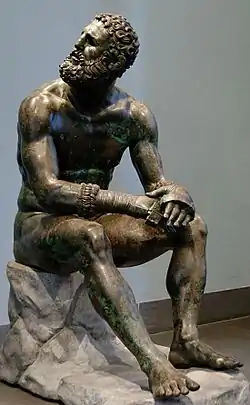
Boxer at Rest, finest example of bronze Hellenistic sculpture
Sports
Equipment
Stadiums
Training facilities
Economy of ancient Greece
Health in ancient Greece
- Medicine in ancient Greece
Science of ancient Greece
- Ancient Greek science
- Greek astronomy
- Greek mathematics
- List of Greek mathematicians
- Chronology of ancient Greek mathematicians
- Timeline of Ancient Greek mathematicians
- List of Greek mathematicians
See also
References
- Stanton, G.R. Athenian Politics c800–500BC: A Sourcebook, Routledge, London (1990), p. 76.
- Andrews, A. Greek Society (Penguin 1967) 197
- E. Harris, A New Solution to the Riddle of the Seisachtheia, in 'The Development of the Polis in Archaic Greece', eds. L. Mitchell and P. Rhodes (Routledge 1997) 103
- Aristotle Politics 1273b 35–1274a 21.
- Fornara-Samons, Athens from Cleisthenes to Pericles, 24–25
- Aristotle, Constitution of the Athenians, §3.
External links
- The Canadian Museum of Civilization—Greece Secrets of the Past
- Ancient Greece website from the British Museum
- Economic history of ancient Greece
- The Greek currency history
- Limenoscope, an ancient Greek ports database
- The Ancient Theatre Archive, Greek and Roman theatre architecture
- Illustrated Greek History—Dr. Janice Siegel, Department of Classics, Hampden-Sydney College, Virginia
This article is issued from Wikipedia. The text is licensed under Creative Commons - Attribution - Sharealike. Additional terms may apply for the media files.
